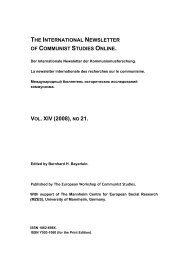11RXNdQ
11RXNdQ
11RXNdQ
You also want an ePaper? Increase the reach of your titles
YUMPU automatically turns print PDFs into web optimized ePapers that Google loves.
The Political Thought of Patrice Lumumba* 111<br />
his cell. They become an object of fascinated meditation for everyone. This became clear<br />
at Thysville when the soldiers who were guarding him mutinied: if they did not receive<br />
their pay, they would release Lumumba, they said. In panic at this threat, the leaders in<br />
Léopoldville approached the Katanganese. A deal was struck: Tschombe would pay; in<br />
exchange, he would be given Lumumba. In short, even from his prison the deposed prime<br />
minister bore witness to the necessity of centralism, all the more so as his fall coincided<br />
with a sudden flare-up of riots and local wars.<br />
More was to come: from October onwards an upsurge in revolutionary disturbances<br />
became noticeable. This time it was the rank and file – peasants and workers – who had<br />
rallied against the maintenance of the colonialist economy. These scattered movements<br />
had no common aim: however, it would have been possible to unite them, beyond the old<br />
divisions, if their demands had been brought together in a common programme. This was<br />
no hysterical fear: later, Gizenga, the new leader of centralism, took radical measures in<br />
Stanleyville: multi-national corporations were to be Africanized and Belgians placed<br />
under house arrest and subject to an exceptional tax; after six months, the State would<br />
seize the abandoned possessions. These decrees marked the beginnings of a<br />
rapprochement between the concrete demands of the masses, lacking a genuine<br />
perspective, and the abstract Jacobinism of the MNC. And Gizenga did not share<br />
Lumumba’s popularity or his intelligence. What would we have had to fear if the former<br />
prime minister had himself grasped that what was required was to reconnect with the<br />
masses, break with the évolués and give a social content to his unitary politics, in short, to<br />
stir up the people against neo-capitalist mystification? That was indeed the whole<br />
problem: Jacobinism is petty bourgeois; it subordinates the economy to political<br />
integration and constantly collides with the demands of the masses, which it accuses of<br />
sabotaging unity. This conflict usually allows enemies to defeat one after the other the<br />
unitary movement and the workers’ movement. But if the Jacobins manage to survive for<br />
a while – and that is extremely rare – they are enlightened by their setbacks and make a<br />
fresh start: unity is no longer the beginning but an intermediary stage, the only way of<br />
cementing together the interests of the masses and their demands. It is also the final goal<br />
of an economic, social and political revolution which, at the risk of breaking up, must<br />
undergo continuous radicalization. I have met young people from the towns – former<br />
students from the middle classes – who were part of Castro’s government: they were<br />
Jacobins against Batista. Having joined the rebels, they had no difficulty in temporarily<br />
abandoning their political ideal to regain it through the movement of socialist<br />
construction. Robespierre and Lumumba died too soon to effect the synthesis which<br />
would have made them invincible. And in the France of 1789 as in the Congo of 1961,<br />
the masses were still mainly rural; in France, the proletariat had not yet been born or<br />
properly developed; in the Congo, Belgian paternalism had stupefied it. In neither case<br />
did the real victims of exploitation have representatives or an apparatus which could<br />
appeal to the politicians to seek unity in the struggle against exploitation. All the same:<br />
there are 3 million black proletarians in the Congo; had Patrice lived, he might well have<br />
ended up inciting them against his own class out of disappointment with it. The fiction he<br />
never exposed, the crazy bourgeois idea of the ‘universal class’ might, under certain<br />
conditions, have facilitated various rapprochements: Lumumba might have been able to<br />
approach the local leaders of the revolutionary movements without guilt or a superiority




